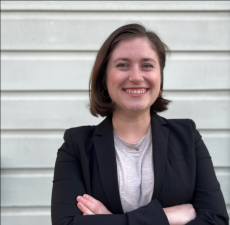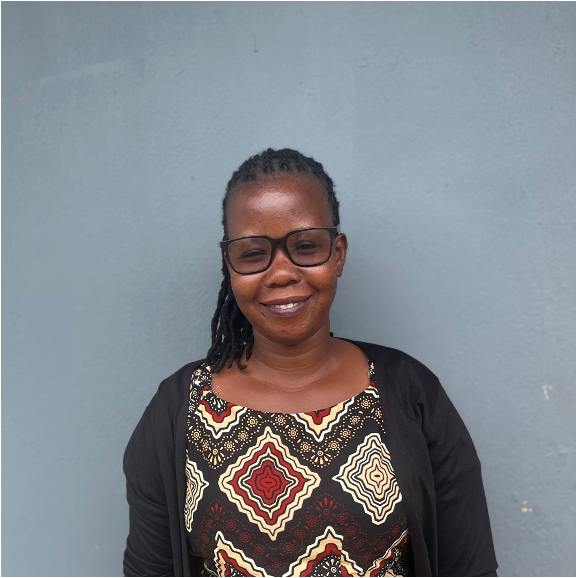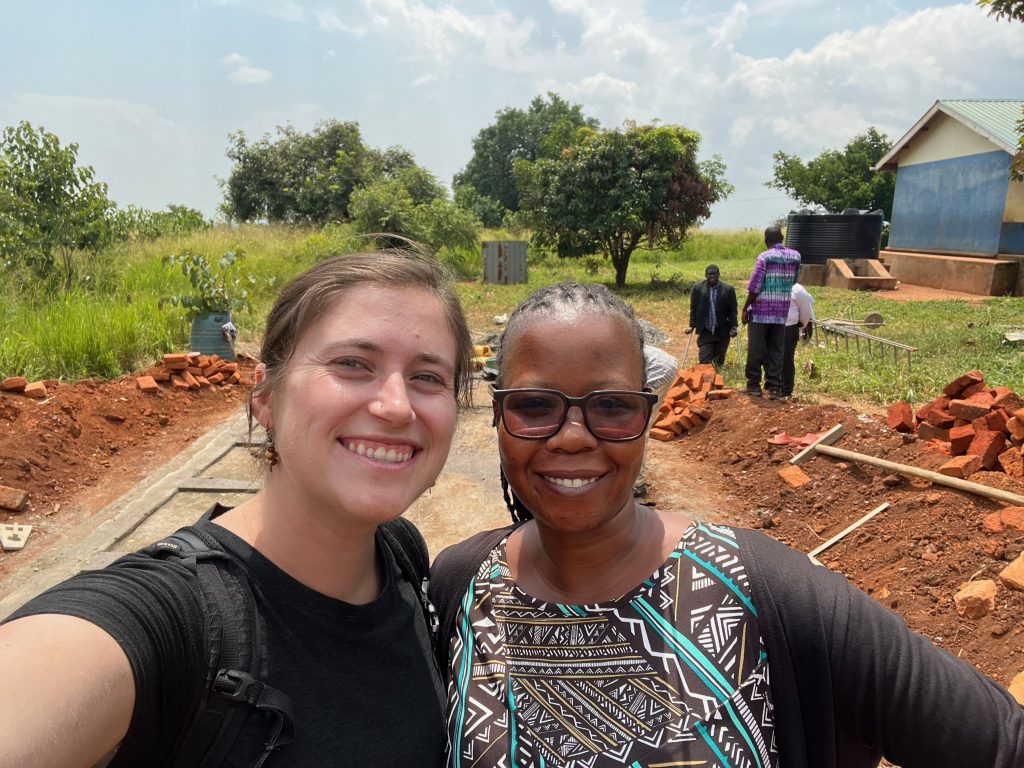This is an article in a series profiling staff at GDPU, the Gulu disability community, and those who call northern Uganda home. All contents of this article have been approved and shared with the permission of Emma.
Emma Ajok has worked at GDPU since 2015. She currently serves as the Safeguarding Focal Point Person and the Water, Sanitation, and Hygiene (WASH) Program Manager. She has an degree in Community-Based Rehabilitation from Kyambogo University and hopes to pursue a career in safeguarding and child protection. I have been lucky to get to know Emma well through our long trips out to Kulu Opal and other schools in the district. She has welcomed me warmly to Gulu and Uganda, whether that’s sharing new food like jackfruit, teaching me how open groundnuts correctly, or helping correct my terrible attempts at speaking Acholi. Emma is proud to call Gulu home and lives here with her son, Josh.
How did you start working at GDPU?
I started working here as a volunteer. I worked on a project for facilitating parents of children with cerebral palsy. I was training them on how to take care of children with cerebral palsy, models like communication, positioning, feeding, toileting.
It was something that I was interested to do because during my internship, I realized that children with disabilities are being locked inside, especially those ones with cerebral palsy. You find the parents tied them inside or even put a padlock on. And they got to do their daily business.
I became concerned. I wished I could do something for these children. So when GDPU gave me the opportunity, I was so excited. Because I knew I would at least make changes, talk to the families. That’s how I got connected to GDPU.
Where did you do your internship that you mentioned?
I did my internship at the local government, at Layibi, one of the divisions in Gulu [District]. There, I was put on a Community-Based Department. Well, we would move to the field with the CDO [Community Development Office]. He would show us where our persons with disability lives, what they do.
How did you first hear about GDPU?
I heard about it from a lady called Florence. She was already here, participating in one of the wheelchair projects. She does sports.
So when I went for my internship, she was like, “I want you to come. I pray to God that you come and work at GDPU.” And I was like, “What is GDPU?” And she was like, “It’s an office for persons with disability. You just need to come and visit.. after you’re done with school, you come and visit.”
What is your role at GDPU?
I’m working as the Safeguarding Focal Point Person. It’s someone who makes sure that GDPU is an organization that respects the rights of persons with disability.
I carry out training of staff, volunteers, interns. I make sure that they know what is in our policy on safeguarding because it’s important that they all have the knowledge on safeguarding. Safeguarding is all about ensuring that GDPUs programs and projects don’t [cause] harm to our beneficials. For example, we need to look at the project design, the timing, the meeting venue… carrying out risk assessment when you carry out an activity so that we don’t expose our beneficiaries to risk.
I am also the WASH Project Manager. I’m managing one of the projects that is being supported by the Advocacy Project. I joined the project five years ago. Every year we install accessible, drainable pit latrines at one of the primary school that is being directed by the DEO [District Education Officer]. We make sure that the school is inclusive. We train teachers on inclusion and how they should do that classroom settings. We also conduct hygiene training to make sure that toilets are clean and there are enough brushes, toilet paper, liquid soap.
You’ve been at GDPU for 9, almost 10 years now. What work have you been proudest of here?
I think I feel so good since I came here. I worked on different projects. One that I did not talk about is V-Plus. It’s a skills training. We recruit youth with disabilities to come and study different skills, like sweater knitting, design and decorations, motorcycle repair, electronics repair.
I feel excited when I go to do follow-up and they’re doing something, they’re earning a living. They’re no longer being discriminated in the community. It makes me so proud.
And also on the WASH project, I think I feel so good when I go to school where we’ve installed of the toilet and the number of children with disabilities or the enrollment has increased because of the package that we put. It also makes me very proud. If I see that they’re taking good care of the toilet, it gives me more energy to advocate for more schools.
How did you become passionate about working with people with disabilities?
I think when I was applying to university, even selecting the course that I did, I already had the passion. Because I remember someone told me “The course that you’re going for – it has sign language, it has braille… you’ll be supporting the vulnerable groups.” I decided yes, I am ready for this.
How did you decide on that course of study?
In Uganda, in Gulu, we had a long period of insurgency, the LRA war. During that period, many people were affected. People got a lot of disabilities. Even my own relatives, others were killed. Others were left disabled – their nose, mouth were cut off. So during that period, I was like, “if there is anything that I would do, and if I can go and study something related to disability, I would be so grateful.”
So when I finished my senior six, I was like, I think I want this course. It will expose me to [the field of disability] more. If I do it, if I have a degree in this, it can push me and I can do more for them. So that’s how I started.
What do you hope GDPU accomplishes in the next 10 years?
I think GDPU is an organization that is committed to advocate for the rights of persons with disability for them to access all that is required for them. GDPU is really working so hard to make sure that there is at least improvement in the lives of persons with disability through advocacy, doing a lot of things that can support them, providing assistive devices.
I wish we would get more funding so that we are able to support the numbers of persons with disabilities in Gulu.
If a donor showed up tomorrow and gave GDPU the equivalent of $1 million USD (about 4 billion Ugandan Shillings), how would you use it?
There is a lot of need for persons with disabilities and I feel GDPU doesn’t have enough resources. I would think if there is money, we would provide enough assistive devices for persons with disabilities. Things like wheelchair, because they are very expensive.
Some people cannot afford them. Actually all of them [cannot afford them]. And the projects that we have here doesn’t meet all their needs.
Things like wheelchairs – you give this and the next year, the child is outgrown and needs another one. So if there is capacity, GDPU would be doing their best to give them assistive devices. Things like the hearing aids will have never given because we don’t have the resources. Even the crutches, the white canes, they’re all very expensive.
What is something you wish people knew about GDPU?
They should know that GDPU is a very committed organization for persons with disability and they are always ready to support. They’re transparent. They have an organized board. We are ready and very committed to do the work.
Do you have any questions for me?
When are you coming back to Uganda?
Posted By Julia Davatzes
Posted Aug 1st, 2024




2 Comments
Mary Ellen Cain
August 5, 2024
Very touching blog. Emma and her staff deserve a lot of credit for the huge task of assisting the disabled community and the progress they have made towards that end. It’s especially wonderful to hear about the disabled people who have learned new skills and are able to earn a living. GDPU is making a real difference in these people’s lives!
Iain Guest
August 11, 2024
Very nice profile of someone who is very special to AP! Also, this helps us to put Emma’s WASH work into a broader context. Thanks Julia!